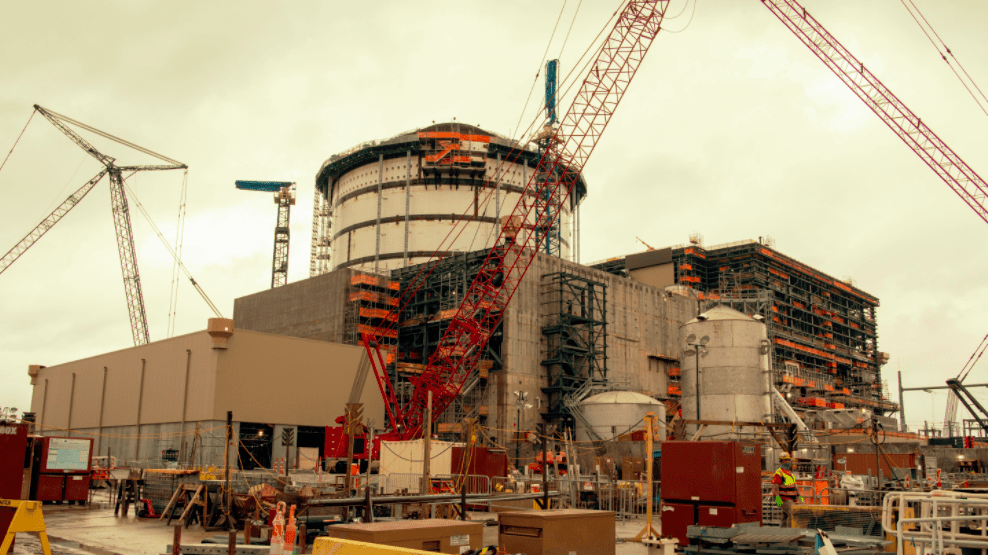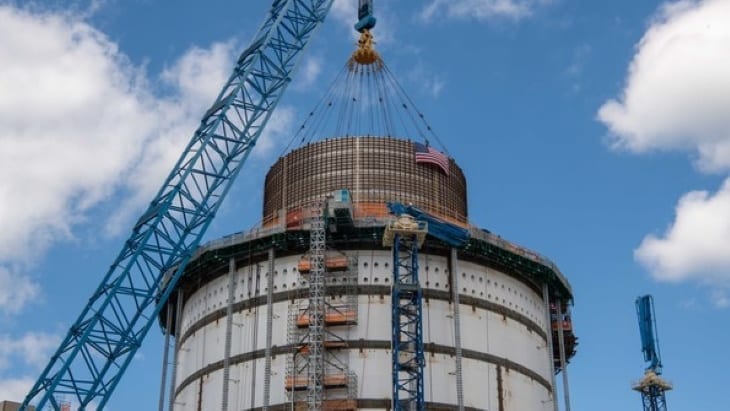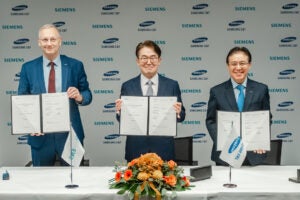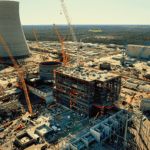Georgia Power has announced more milestones for its Vogtle nuclear power plant expansion project, including the start of hot functional testing for Unit 3 at the facility in Waynesboro, Georgia. The utility also said it could bring the reactor online as soon as December of this year, despite continued construction delays due in part to the coronavirus pandemic.
Tom Fanning, the CEO of Georgia Power’s parent, Atlanta-based Southern Co., told analysts in an April 29 call that the utility is “making great progress on Vogtle. I think we have resolved the delays, and we think we have a clearer path. We can see the light at the end of the tunnel and we are imbued with enthusiasm.”
Fanning on Thursday said Unit 3, the first of two new reactors, could begin operating in late December, though any further delays could push it into the first quarter of 2022. The second of the two new reactors is currently scheduled to be in operation in November 2022.
Fanning’s comments came after Georgia Power on April 26 said the last major crane lift project at the site was completed, as a massive water tank was placed on top of the Unit 4 containment vessel and shield building roof. All modules for the project (Figure 1) are now in place; the shield building roof was placed on Unit 4 in December of last year.
Hot functional testing of Unit 3 is conducted to verify that reactor components and systems are operating successfully, and to confirm the reactor is ready for fuel load. The first shipment of nuclear fuel for Unit 3 was delivered in December 2020.
In-Service Dates
Southern Co., the parent of Georgia Power, in a March 19 filing with the U.S. Securities and Exchange Commission said that Southern Nuclear, its nuclear subsidiary, “continues to target a November 2021 in-service date for Unit 3,” though it also said “the schedule is challenged and… a delay is likely and could add one month or more to the Unit 3 in-service date.” Fanning’s comments Thursday confirm that the in-service date would be late December at the earliest.

Georgia Power in March said it estimated delays beyond November “would result in additional base capital costs for Georgia Power of approximately $25 million per month.” The project, first approved by state regulators in 2009, with an original estimated cost of about $14 billion, now projects to enter commercial operation about five years after initial expectations. Analysts predict the cost of the two-unit expansion will have doubled by the time it is complete. Construction of the two new units began in 2013.
The site team at Vogtle will run plant systems for Unit 3 without nuclear fuel for the next several weeks, advancing through the testing process and using the heat generated by the unit’s four reactor coolant pumps to reach a normal operating pressure and temperature.
Once those levels are reached and sustained, the unit’s main turbine will be raised to normal operating speed using steam from the plant. Operators during testing will be able “exercise and validate procedures as required ahead of fuel load,” according to Georgia Power. The hot functional testing process is expected to take six to eight weeks.
Cold functional tests, which are carried out to confirm whether components and systems important to safety are properly installed and ready to operate in a cold condition, were completed on Unit 3 last October. Georgia Power said the main purpose of those tests was to verify the leak-tightness of the primary circuit.
More Than 7,000 Workers Onsite
The utility said more than 7,000 workers are onsite in Waynesboro. More than 800 permanent jobs are expected to be available at the plant once the units begin operating.
The 750,000-gallon water tank (Figure 2), known as the CB-20 module, is a major part of the reactor’s advanced passive safety system. The tank is 35 feet tall, and weighs more than 720,000 pounds. It will hold water to help cool the reactor in an emergency situation. Water from the tank also can be directed into the reactor’s used fuel pool, while the tank itself can be refilled from water stored elsewhere at the plant.

The expansion project, which involves the addition of two new Westinghouse-supplied AP1000 reactors at Plant Vogtle, has been plagued by construction delays and cost overruns. Official estimates of the project’s cost have been pegged at $25 billion, up from the original $14 billion; other estimates have put the project’s cost at closer to $30 billion. Georgia Power in securities filings has noted several impacts from the pandemic, including disruptions to supply chains and reduced availability of labor.
The utility in 2020 at one point cut about 2,000 of the 9,000 workers onsite at Vogtle in an effort to lessen the spread of the coronavirus. The company in an August 2020 filing with the Georgia Public Service Commission said more than 1,000 workers had tested positive for COVID-19, and also said about 6,600 workers at the site had been isolated at some point after possibly being in close contact to someone who had tested positive for the virus.
The Vogtle project represents the only two commercial reactor units currently under construction in the U.S. Units 1 and 2 at Vogtle have operated since 1987 and 1989, respectively. Georgia Power owns 45.7% of Plant Vogtle. Three other project partners—Oglethorpe Power Corp., the Municipal Electric Authority of Georgia, and the City of Dalton Utilities—own the remaining 54.3%.
—Darrell Proctor is associate editor for POWER (@POWERmagazine).









